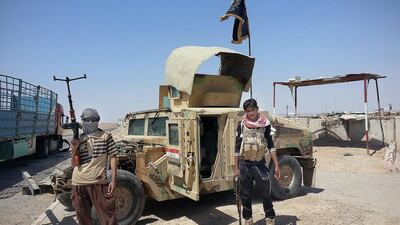The new year started with an exchange of positive messages between Tehran and Washington. President Obama, commenting on talks slated for next week between the Islamic Republic and the P5+1 group in Geneva, said Tehran “has an opportunity to reconcile with the world” and that a deal over its nuclear programme would make it “a very successful regional power”.
A few days later, his Iranian counterpart Hassan Rouhani responded that his country cannot expect to develop in isolation and confirmed Iran’s need for foreign investment as a condition for prosperity.
Meanwhile in Iraq, US fighters are scouring the skies and Iran’s forces are advancing on the ground, Al Hayat editor Ghassan Charbel noted.
“Obama and Rouhani forgot to thank Al Baghdadi, the leader of the Islamic State in Iraq and the Levant, for if it weren’t for ISIL’s ‘gifts’, Washington and Tehran couldn’t have achieved such rapprochement,” he wrote.
He described ISIL’s terrifying emergence in Iraq and Syria as an unexpected gift to president Obama. It brought Iraq back into the spotlight and meant that Syria was no longer the main or unique issue at hand. It is no secret that the US president never saw the Syrian crisis as an opportunity for intervention or for scoring points.
“ISIL’s rise helped in removing Nouri Al Maliki, who, although had successfully presented himself as a necessity for Iran and the US, has recently become an obstacle for both parties,” Charbel wrote.
“The swift surrender of whole squadrons of the Iraqi army and growing fears of yet another dictatorship in Iraq pressured Iran to persuade Al Maliki to step down.”
The terrorist organisation’s plan to invade Erbil and take over Kirkuk and its oilfields gave the US the perfect excuse to mobilise its forces and its allies to fight ISIL and stop its expansion.
Iran too benefited from ISIL’s plans, as for once, the world didn’t look at it as the source of all the threats in the region. The extremist group’s atrocities gave the impression that the primary threat in Syria is that of terrorist organisations and somehow validated Iran’s actions in Syria as efforts to contain the threat.
“It is even safe to say that ISIL’s behaviour was a service to the Syrian regime, which finds itself today in a far better situation as the extremist group made its way to the top of the agenda of the region’s countries,” he added.
ISIL has achieved the exact opposite of what it preaches. It became a calamity to those it claimed to defend and benefited those it claimed to oppose.
Younes Al Sayyed, a columnist in the Sharjah-based daily Al Khaleej, contended that the hard blows ISIL has received in Iraq and Syria – leading to its withdrawal on several fronts – indicates that the beginning of the end is near for the terrorist organisation.
The invasion of Mosul and the battle of Kobani on the Turkish border in northern Syria were turning points for the group because they led to an international mobilisation of military powers and justified the arming of Kurdish communities, allowing them to regain control over most of the areas they had lost to ISIL.
“ISIL’s failing on most fronts and the escalation of competitive struggle with other terrorist Islamist groups such as Al Nusra Front and the Army of Islam, coupled with its inability to manage territories under its occupation all formed to signal the beginning of its decline,” he noted.
It might be too soon to speak of ISIL’s defeat, especially when there are regional and international players that benefit from the group’s presence. Nonetheless, several indicators seem to suggest that the terrorist organisation is indeed on the wane.
Translated by Racha Makarem
rmakarem@thenational.ae

